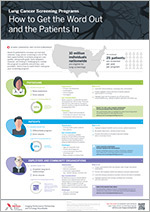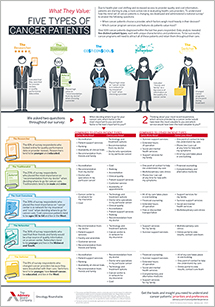Auto logout in seconds.
Continue LogoutThe American Cancer Society (ACS) on Wednesday recommended patients start colorectal cancer screening at age 45, instead of 50, based on evidence that diagnoses are increasing among young and middle-age adults.
June 21 webcon: Get the latest innovations in surgical and interventional oncology
Colorectal cancer is the second-leading cause of cancer death in the United States. According to Modern Healthcare, the update marks the first time ACS has changed its guidelines for colorectal cancer screening since 2009, and it includes the earliest age for screenings that has yet been endorsed by a major U.S. medical society or group. Most medical groups recommend men and women begin screening for colorectal cancer at age 50.
ACS' new recommendations
ACS in guidelines published in its peer-reviewed journal CA: A Cancer Journal for Clinicians said new research shows colorectal cancer rates are rising among young adults, and that the evidence suggests people at average risk for colon or rectal cancer should begin screening at age 45. According to the New York Times, the guidance change would open up colorectal screening to an addition 22 million U.S. residents between ages 45 and 49.
The group said screenings should continue until age 75, at which point physicians and patients should make individual screening decisions that factor in health status, life expectancy, and patient preference.
ACS in the guidelines said the go-to screening does not have to be a colonoscopy, which is an invasive procedure that carries risks, such as a perforated bowel. Instead, the guidelines recommend physicians offer patients a choice between six different colorectal cancer screening options, including lab tests on stool samples, which can be conducted more regularly and are followed by colonoscopy if results are positive.
ACS published the new guidelines on the same day it released a study that found colorectal cancer incidence and death rates among those 55 and older have fallen in recent decades, while rates among adults under 50 rose by about 50% between 1994 and 2014.
In addition, an ACS analysis published in February found that adults born in 1990 have nearly double the risk of colon cancer and quadruple the risk of rectal cancer compared with the risk that adults born in 1950 faced at a comparable age. An August study showed colorectal cancer death rates also have risen among adults under 50, with mortality rates among those ages 20 to 54 rising by 1% annually from 2004 to 2014.
Experts attribute the decline in the older population in part to early detection, but say there's currently not enough data to explain the uptick among adults under age 50.
ACS said it does not recommend routine screening for healthy patients under age 45 because cancer rates in that age group are low and do not outweigh the risks of procedures such as colonoscopies.
In addition, given the lack of clinical trials looking at the effect of colorectal cancer screening among those under age 50, ACS describes its recommendations as "qualified." Andrew Wolf, an associate professor of medicine at the University of Virginia who led the ACS group that issued the new recommendations, said that means "we hope that doctors will look at this and at least start discussions of colorectal cancer screening with their 45-year-old patients."
According to the New York Times, ACS' new guidelines put them at odds with other prominent groups, such as the U.S. Preventive Services Task Force (USPSTF), which still recommend colorectal cancer screening at age 50. The disconnect raises questions on whether insurers will cover the tests for younger adults. Under the Affordable Care Act, insurers are required to cover preventive services that receive a "B" grade or higher from USPSTF without cost-sharing.
Reaction
Thomas Weber, co-chair of an early-age onset colon cancer task group for the National Colorectal Cancer Roundtable, who was not involved in ACS' new recommendation, called lowering the age for initial screening "a game changer" that could save thousands of lives. Weber said, "This is a very, very big deal," adding, "Solid epidemiological data from our national cancer registries documents a dramatic increase in the incidence of colon and especially rectal cancer among individuals under the age of 50, and the vast majority of those cases are in the 40- to 49-year-old age bracket."
Robin Mendelsohn, a gastroenterologist who is co-director of the Center for Young Onset Colorectal Cancer at Memorial Sloan Kettering Cancer Center, said, "What's really important is for physicians to be aware" of the risk for young adults. He said, "Many of our young patients say, 'Well I saw five doctors who said it was hemorrhoids and thought I was too young to have cancer.' One of our main goals is to get the word out to all the physicians who are seeing these people first."
Nancy You, associate professor of surgical oncology at MD Anderson Cancer Center in Houston, raised concerns that the conflicting recommendations among professional organizations could be confusing, but ultimately, she said the change gives patients more flexibility in their care. "For patients who might have concerns and who do want to be more proactive, they have the option of starting a little bit earlier," You said.
Stanford University internist Douglas Owens, the vice chair of the USPSTF team that issued the group's 2016 recommendations on colorectal screening, said, "There was limited data on screening people under age 50" when his team issued their recommendations. But he said the new ACS guidelines should spur more research into the potential benefits and harms of screening adults under 50 (Caryn Rabin, New York Times, 5/30; Ross Johnson, Modern Healthcare, 5/30; Painter, USA Today, 5/31; Neighmond, "Shots," NPR, 5/30).
June 21 webcon: Get the latest innovations in surgical and interventional oncology
Learn how best-in-class organizations are integrating surgical oncology and interventional oncology into their cancer programs, as well as technology overviews and strategies to maximize the value of these services.
Don't miss out on the latest Advisory Board insights
Create your free account to access 1 resource, including the latest research and webinars.
Want access without creating an account?
You have 1 free members-only resource remaining this month.
1 free members-only resources remaining
1 free members-only resources remaining
You've reached your limit of free insights
Become a member to access all of Advisory Board's resources, events, and experts
Never miss out on the latest innovative health care content tailored to you.
Benefits include:
You've reached your limit of free insights
Become a member to access all of Advisory Board's resources, events, and experts
Never miss out on the latest innovative health care content tailored to you.
Benefits include:
This content is available through your Curated Research partnership with Advisory Board. Click on ‘view this resource’ to read the full piece
Email ask@advisory.com to learn more
Click on ‘Become a Member’ to learn about the benefits of a Full-Access partnership with Advisory Board
Never miss out on the latest innovative health care content tailored to you.
Benefits Include:
This is for members only. Learn more.
Click on ‘Become a Member’ to learn about the benefits of a Full-Access partnership with Advisory Board
Never miss out on the latest innovative health care content tailored to you.


